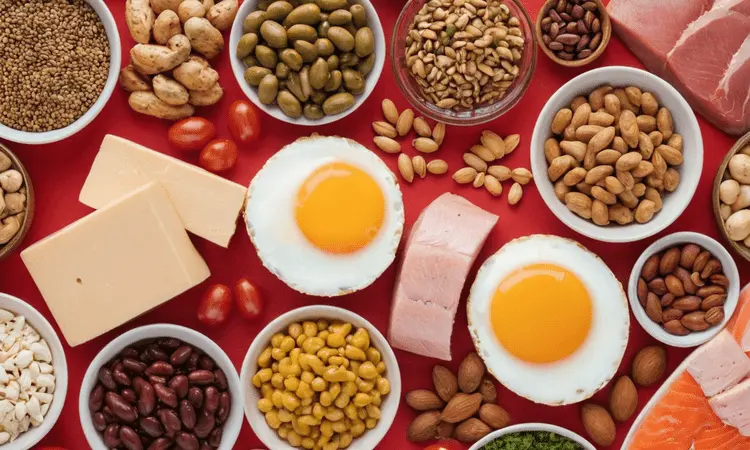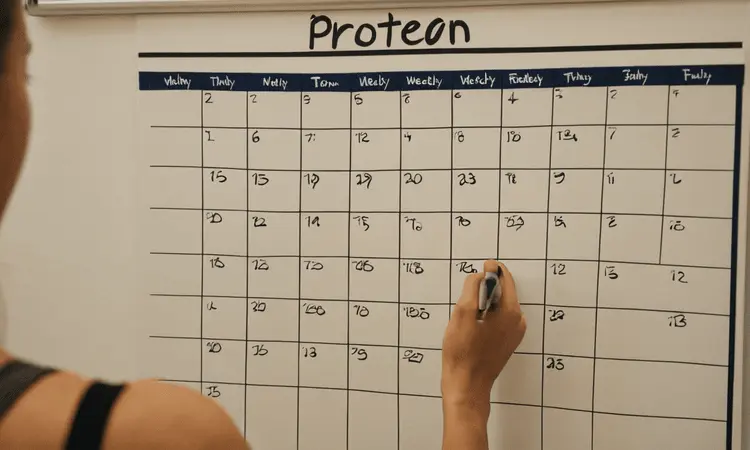Are you confused about protein intake recommendations? With so much conflicting information, it’s hard to know how much protein you need for your goals.
Whether you’re aiming to build muscle as an athlete or simply want the best protein sources for a healthy diet, uncertainty about protein requirements can hold you back.
Without the right amount of protein, your body struggles. You might lack energy, lose muscle mass, or feel unsatisfied after meals. Navigating complex dietary protein guidelines can be a major headache!
This ultimate guide breaks down everything you need to know about protein intake recommendations. Learn how to calculate your individual needs, discover the best sources of protein, and optimize your intake for peak performance and overall health.
Get ready to feel stronger, more energized, and empowered with your nutrition!
Protein Intake: The Need-to-Know
- Protein builds and repairs tissue
- Needs depend on your goals
- Calculate intake based on weight
- Prioritize whole-food protein sources
- Spread protein throughout the day
- Talk to a doctor for specific advice
Table of contents
Introduction

Understanding Protein: Your Body’s Building Blocks
Think of your body as an incredible structure, constantly repairing and renewing itself. What’s the key building material? Protein! It’s in your muscles, bones, hair, and even your blood. But how much protein do you actually need for optimal health?
Let’s dive deeper. Proteins are made up of tiny units called amino acids. Some of these your body creates, but others – the essential amino acids – must come from your diet.
Getting the right balance is vital for everything from feeling energized to building a strong immune system.
How Much Protein Do You Really Need?
Is there a magic number for everyone when it comes to protein intake recommendations? Not exactly.
While the Recommended Dietary Allowance (RDA) is a good baseline, it’s just the start. Think of it as the minimum to prevent problems. Your ideal protein intake depends on factors like:
- Age: Growing kids and older adults often need a bit more.
- Activity level: Athletes and super active folks require more protein for muscle repair.
- Goals: Aiming to gain muscle or lose weight? You’ll need to adjust your protein intake.
Additionally, remember that protein should be part of a balanced diet – it’s not about eating protein alone! To learn more about how much protein is right for you, check out the Official Dietary Guidelines.
Think all protein comes from meat? Think again! Prepare to be surprised by the incredible world of plant-based protein – your body and tastebuds will thank you…
Deciphering Protein Intake Recommendations Requirements
Calculating Your Protein Needs Made Easy
Figuring out protein intake recommendations can feel like solving a complex puzzle, right? Don’t worry; we’re breaking it down! The first step is figuring out how much protein your body actually needs.
Forget those one-size-fits-all recommendations. Your protein needs are unique. Factors like your activity level, body size, and fitness goals all play a role.
Protein Intake Recommendations Needs for Specific Goals
Are you aiming to build muscle, lose weight, or simply maintain a healthy lifestyle? Your protein needs will vary!
- Muscle Building: To fuel muscle growth, aim for a higher protein intake. Research suggests that active individuals may need upwards of 1.4-2 grams of protein per kilogram of bodyweight daily.
- Weight Loss: Is weight loss your goal? Protein is your friend! It helps preserve muscle mass while you’re in a calorie deficit, leading to a healthier body composition.
- Athletes & Active Individuals: All that training means your body needs more protein for repair and recovery. Depending on the intensity and duration of your workouts, your protein needs will likely be higher than the average person’s.
- Seniors: As we age, our bodies naturally lose muscle mass. Prioritize protein intake to combat this decline and maintain strength and functionality.
The Best Dietary Protein Sources
Okay, we know how much protein you need, but where do you get it? Focus on high-quality sources! Here’s a breakdown:
- Animal-based: Lean meats, poultry, fish, eggs, and dairy products are all excellent sources of complete protein. Look for options that align with the Official Dietary Guidelines.
- Plant-based: Vegans and vegetarians, don’t worry! You’ve got options too. Lentils, beans, tofu, tempeh, nuts, and seeds offer protein alongside other essential nutrients. Check out resources from the International Society of Sports Nutrition for expert guidance.
Remember, variety is key! A mix of protein sources ensures you get all the amino acids your body needs.
Optimizing Your Protein Intake

Protein Distribution Throughout the Day: Does Timing Matter?
Think you can slam your whole day’s protein in one giant steak dinner? Think again! Research suggests that spreading your protein intake throughout the day might be a better strategy.
Why is this? Well, your body can only use a certain amount of protein at once for muscle building and repair. Spreading it out may give your muscles a steady supply of amino acids for optimal growth.
- Aim for 20-30 grams of protein per meal. This could look like eggs for breakfast, a protein shake after a workout, chicken salad for lunch, and fish for dinner.
Protein Supplements: When and Why?
Busy schedules and picky eaters sometimes make hitting your protein goals tough. Can protein supplements help? In certain situations, yes!
- Whey protein: Fast-digesting, great for post-workout recovery.
- Casein protein: Slower-digesting, ideal before bed.
- Plant-based protein: Perfect option for vegans and vegetarians.
Before relying on supplements, remember that whole foods should form the foundation of your diet. For a personalized supplement plan, check out the resources from the International Society of Sports Nutrition.
Protein Quality: Beyond the Quantity
Not all protein is created equal. Want to get the most bang for your buck? Focus on high-quality protein sources. These are easily digested by your body and provide ample essential amino acids.
- Aim for complete proteins: These contain all the essential amino acids your body can’t make on its own. Think animal-based options as well as quinoa and soy.
- Combine incomplete protein sources: Lentils + rice = complete protein power!
Knowing about protein quality is key to making the most of your protein intake recommendations.
Let’s Chat! Have you noticed benefits from changing your protein distribution or adding a supplement? Let me know in the comments or share your protein wins on social media!
Potential Concerns and Considerations

Can You Have Too Much Protein?
You’ve heard protein is essential, but is there such a thing as too much? The answer is yes. While protein is crucial, consistently consuming far more than your body needs can have potential downsides.
Think about it: Your body has limited capacity to use protein. Excess protein might strain your kidneys or cause digestive discomfort. Furthermore, an overemphasis on protein often means you’re skimping on other vital nutrients from fruits, vegetables, and whole grains.
Protein Intake with Special Health Considerations
If you have pre-existing health conditions, it’s wise to personalize your protein intake recommendations. Here are some situations where extra caution is warranted:
- Kidney Disease: Talk to your doctor or a registered dietitian. They can guide you on how much protein is safe for your kidneys. Find research-backed dietary guidelines on Official Dietary Guidelines.
- Liver Disease: Similar to kidney concerns, your individual protein needs might be adjusted. Consulting a healthcare professional is essential.
- Other Conditions: Certain medications or medical situations may call for a modified protein intake. Always keep your doctor informed about your diet.
Key Takeaways:
- Prioritize a balanced diet with protein as one important piece of the puzzle.
- Listen to your body – discomfort after protein-heavy meals could signal a need for adjustment.
- If you have health concerns, personalized advice from a medical professional is crucial for your well-being.
Let me know if you have any questions or want to explore specific situations in more detail! Feel free to leave comments below or tag me on social media.
Did you know that not all protein sources are created equal for weight loss? Unlock the secrets to choosing the most effective protein foods for shedding pounds and feeling your best. Click here for our ‘Protein Foods List for Weight Loss’.
Your Protein Intake Recommendations Questions Answered
This depends on your weight, activity level, and goals. A general starting point is 0.8 grams of protein per kilogram of body weight.
Multiply your weight in kilograms by 0.8 grams for a baseline. Active individuals and those aiming to build muscle may need more.
Aim for 1.6 – 2.2 grams of protein per kilogram of body weight if you’re focused on muscle growth.
The general recommendation is 0.8 grams per kilogram. This can increase based on your activity level and fitness goals.
Yes! Combine legumes, soy products, nuts, seeds, and certain whole grains for a complete amino acid profile.
Spread your protein intake throughout the day for optimal muscle growth and satiety.
They can be convenient, but prioritize whole-food sources of protein.
Calculate your needs based on body weight and activity level. Talk to your doctor if you experience fatigue, muscle loss, or slow workout recovery.
Excessive protein intake over time can potentially strain your kidneys. Aim for a balanced diet.